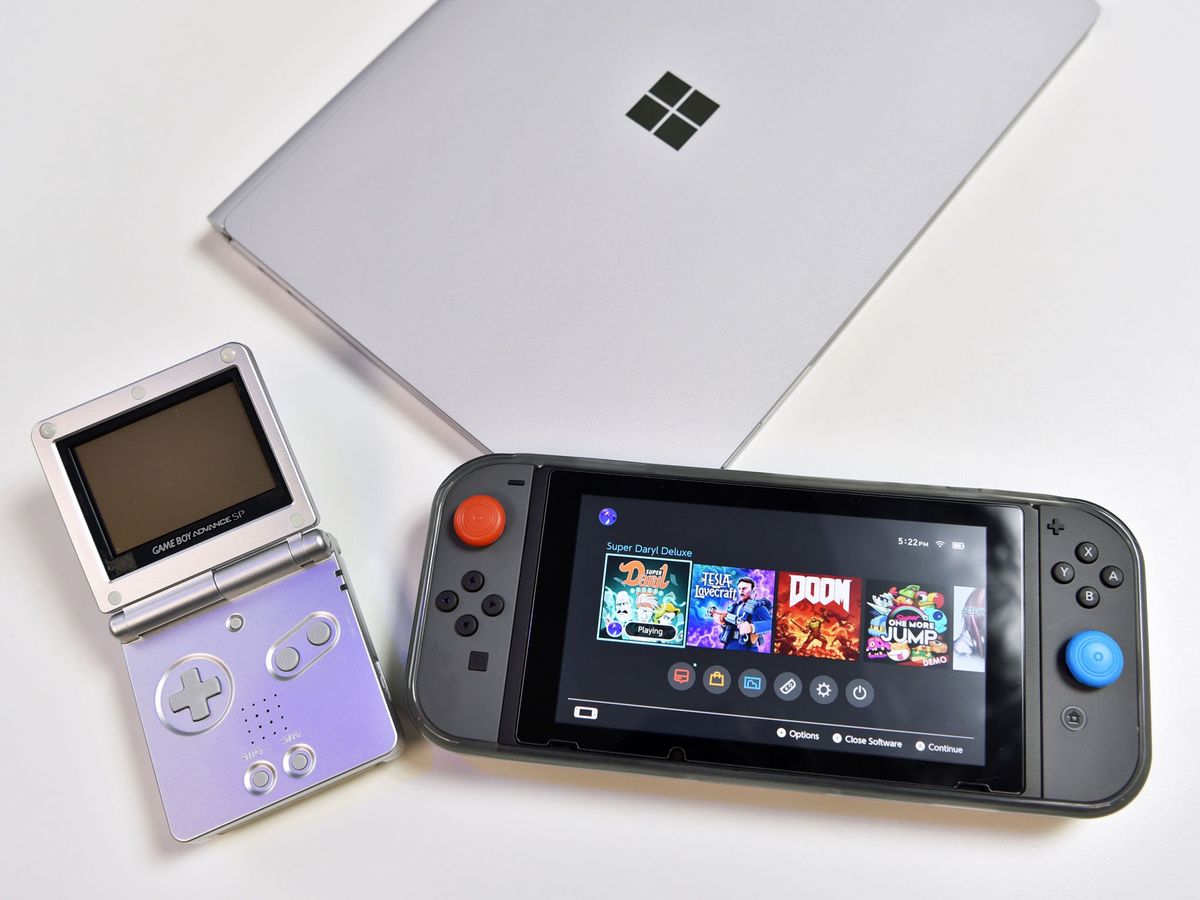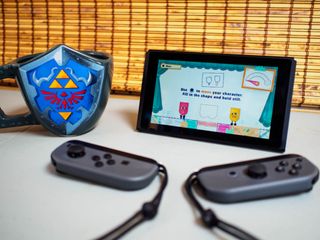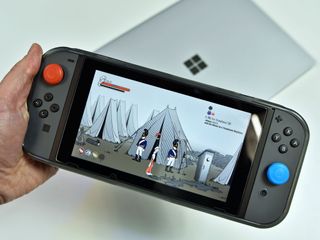There's no excuse for Microsoft not making an 'Xboy' to rival Nintendo Switch
Microsoft is blowing it by not having a handheld gaming strategy. This is why.

I finally broke down and bought a Nintendo Switch. I had been eyeing the handheld gaming system for some time. The constant stream of new game announcements, including surprises like DOOM, was too much to resist. Could it be that fun?
A week later, I now consider myself a part of the Switch cult, an evangelist of the giant, clunky device I now feel is as important as my smartphone.
So why hasn't Microsoft ever made a handheld gaming console? It should. It's not too late, and the company is leaving money on the table if it doesn't.
All the right pieces
The handheld gaming market is finicky, especially with the rise of smartphone gaming and Android. That is where a lot of mobile gaming is these days, so it seems crazy to sell a $300 device that – for many – duplicates that functionality.
Nintendo sold 15 million Switches in 2017, and it expects to sell another 20 million this year. Those sales put it in the range of the Sony PlayStation 4.
While the Switch is touted as a handheld and a console, it uses a standard USB Type-C video and audio connector found on most smartphones and laptops. It's not magic.
For all its shying away from consumer hardware, Microsoft is in deep with gaming. Investments in Xbox, cloud gaming, and Mixer reveal gaming as the pure consumer play with a lot of traction.
Get the Windows Central Newsletter
All the latest news, reviews, and guides for Windows and Xbox diehards.
How hard would it be for Microsoft to make a handheld gaming device? Let's check the boxes that it already has:
- Hardware engineering group (Surface).
- Gaming IP including original Halo series, Gears of War, and Forza.
- Cloud abilities with Azure.
- Windows 10 and Microsoft Store for distribution.
- Universal Windows Platform (UWP) for games and apps.
- Retail partners and distribution channels.
- Gaming controller know-how.
- Mixer game streaming.
- Xbox brand.
Microsoft is in a unique position compared to Nintendo, where the company controls everything from gaming content, 20 years of content, distribution, cloud computing, and even the ability to make custom silicon for hardware (see Xbox One X).
Toss in Mixer with a front-facing camera into a handheld while playing Fortnite, and it seems like a no-brainer.
Leverage nostalgia

We're at a unique crossroads in technology. For the first time, we can reminisce about the "good ol' days." Nokia knows this with its recent retro phones, and Nintendo does too with mini versions of its old consoles.
Heck, I recently found my original Gameboy Advance SP and a flood of playing SIMS on it for hours came rushing back.
Microsoft, though, doesn't appear to know the value of nostalgia. The idea of a handheld Xbox gaming device that ran original Xbox, Xbox 360, and even Xbox One titles would be huge. The ability to take Master Chief on the train or do a quick Forza run (with friends) seems like an obvious sell to those yearning to replay older games.
I take that back — Microsoft does know this, which is why its Xbox One backward compatibility program is so successful. The idea of taking that technology and putting it on a handheld with the bonus of Xbox LIVE syncing and Wi-Fi connectivity seems like an obvious win.
Leverage indies from Steam
Besides getting crazy games like DOOM and even Wolfenstein II (June 2018), the Switch piqued my interest because of the sheer amount of smaller indie games. These aren't games made for the Switch but titles already found and sold on Steam.
Again, Microsoft knows how talented this group is with its successful ID@Xbox program, where smaller and independent game makers can play with the big boys.
But being able to play Super Daryl Deluxe or Retro City Rampage DX next to the latest Zelda title while waiting at the DMV? Priceless.
Plus, with prices ranging from $4 to $20, these games are much easier to invest in than Kirby Star Allies, which fetches a stupid $60.
Microsoft Store for apps

Perhaps the one area where Microsoft could improve on the Switch is its apps and Store. It already has the infrastructure built. Why not let me run Netflix, Hulu, my Movies & TV collection, Microsoft Edge, and heck, even Skype on a mobile gaming device engineered by the Surface team?
If Microsoft wants users to take advantage of the Microsoft Store, putting it in the hands of mobile gamers is better than not giving that option.
The bottom line on Microsoft and mobile gaming

Microsoft could make a killer, portable gaming console. But the company lacks the will.
That's not conjecture, as ex-Microsoft lead Robbie Bach said precisely that in 2015 when asked about the rumored "Xboy" project. "We just couldn't focus," said Bach, "we just did not have the bandwidth."
Letting users play Halo on the go or taking advantage of UWP apps from the Store seems obvious. The company could even create a fantastic dock with external GPU acceleration to push those games to the limit for the TV.
Nintendo is proving this market is viable – even with pretty janky hardware and against a lot of initial negative press.
Even without that technology, Bethesda got DOOM to run at 30 frames per second (FPS) at just 720p on the Switch. That is hardly amazing, but read the reviews. No one is complaining because the experience is terrific.
If Microsoft were smart, it would take advantage of its 20 years in gaming by going beyond backward compatibility and creating a portable brand. Mix in your ID@Xbox connections, some Surface-level engineering, quality Xbox LIVE, and a growing market of 30- and 40-year-olds with money to spend, and this could be a hit. A huge one.
But only if Microsoft finds the will to make that happen.

Daniel Rubino is the Editor-in-chief of Windows Central. He is also the head reviewer, podcast co-host, and analyst. He has been covering Microsoft since 2007 when this site was called WMExperts (and later Windows Phone Central). His interests include Windows, laptops, next-gen computing, and wearable tech. He has reviewed laptops for over 10 years and is particularly fond of 2-in-1 convertibles, Arm64 processors, new form factors, and thin-and-light PCs. Before all this tech stuff, he worked on a Ph.D. in linguistics, performed polysomnographs in NYC, and was a motion-picture operator for 17 years.